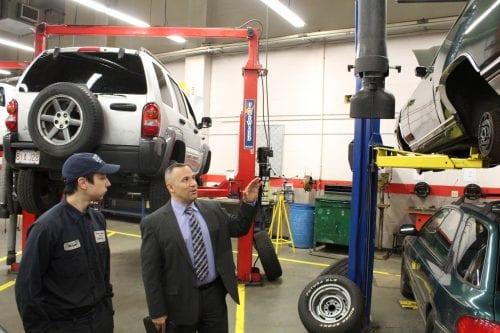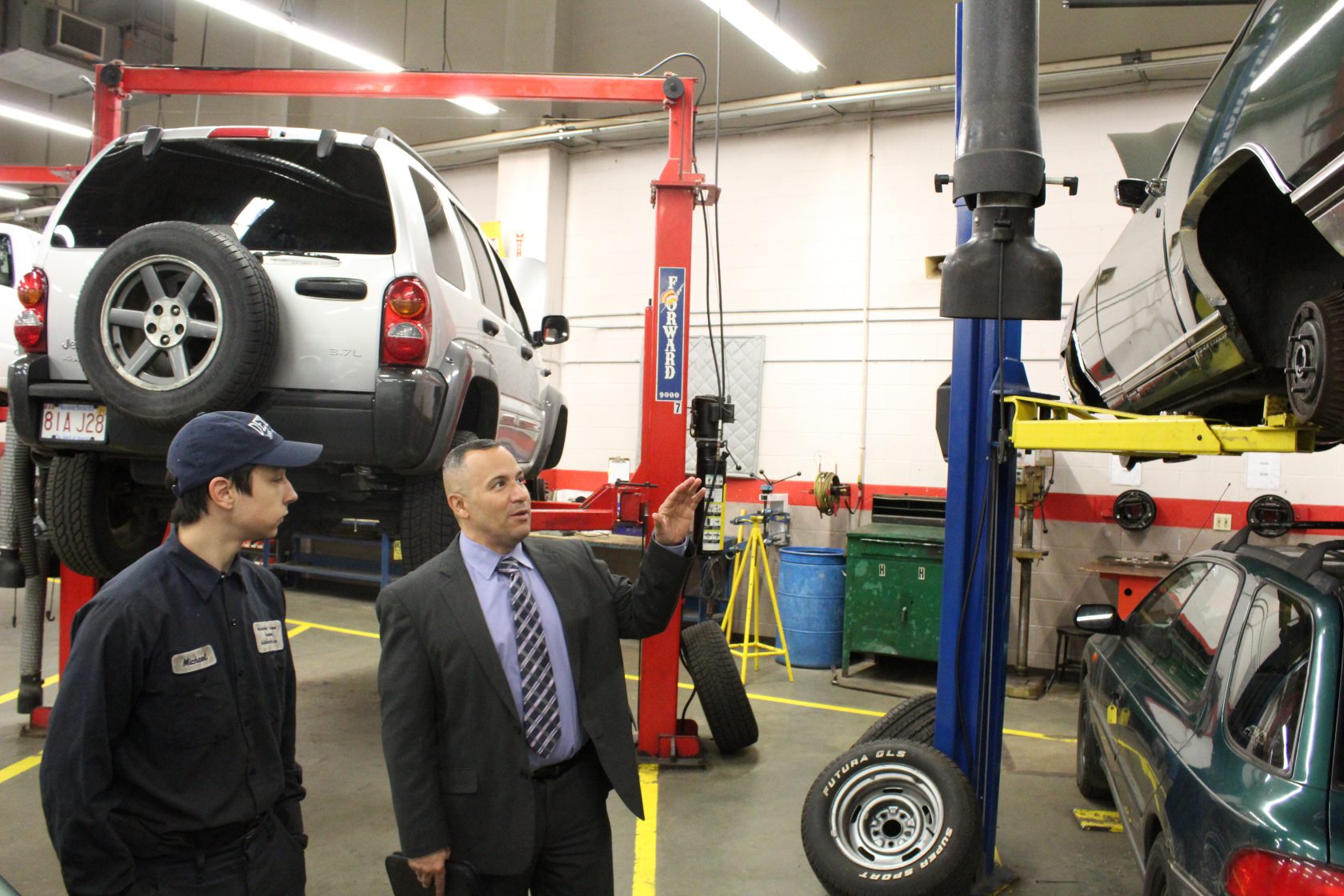Westfield Tech instructors weigh-in

A Westfield Technical Academy Automotive Technology student speaks with School Committee member Ray Diaz during a tour of the school Jan. 21. (THE WESTFIELD NEWS)
WESTFIELD – Residents have been bombarded for the last couple of months with television ads and fliers on both sides of Question 1, popularly called the “Right to Repair.”
The ads are confusing, with each side debunking the other’s warnings about a cybersecurity threat to personal information, or the manufacturers restricting access to repair of new cars by local mechanics.
Massachusetts already has a Right to Repair law which was passed by 87% of voters in 2012, and was then modified through legislation before enactment in 2013.
The new ballot question proposes to require that motor vehicle owners and independent repair facilities be provided with expanded access to mechanical data related to vehicle maintenance and repair. Starting with model year 2022, the proposed law would require manufacturers of motor vehicles sold in Massachusetts to equip any such vehicles that use telematics systems –systems that collect and wirelessly transmit mechanical data to a remote server – with a standardized open access data platform.
To get to the bottom of the claims, The Westfield News asked Westfield Technical Academy automotive and information technology instructors their opinions on Question 1.
Automotive Technology Instructor Timothy Elliott said he has been receiving many inquiries on Question 1 recently due to the conflicting messages on TV
“Voting yes on 1 would allow independent repair facilities and schools’ automotive programs to have access to data to repair newer vehicles. Voting no would let car manufacturers create data specific for their vehicles, which would require owners of the vehicles to have their vehicle serviced only at the dealer,” Elliott said.
“Auto manufacturers are spending money to create these scary ads showing vehicles being overtaken and crashed by a hacker to scare people into voting no. The chances of someone hacking a vehicle the way shown in those ads is extremely unlikely, and we have had enough access to overtake someone’s vehicle like that for years now already. Auto manufacturers routinely receive information from vehicles without the owners knowledge, and that has been happening for years as well. I recently scanned a vehicle navigation unit for codes looking for a malfunction, and I was able to see any place the vehicle had ever been since it was made,” Elliott said, adding, “Would I do anything with that information? Absolutely not. My job is to repair the vehicle, I don’t need that information. Auto manufacturers receive that information back via satellite and use it for marketing and development purposes.”
Elliott said auto manufacturers want people to vote no so they can gain revenue on vehicles they sell.
“They want to shut down independent repair shops by creating systems only available for repair at their dealerships. Voting yes would protect small businesses and people like me, who teach automotive technology and work on vehicles at home,” he said.
WTA Information Technology Department Chair Kevin Grimsley said he would not take an official position on the issue, but listed some key points that he thinks are important to think about when making an informed decision.
“Information that the vehicle stores needs to be protected from getting into the wrong hands. The ballot question is admittedly vague on what information needs to be available, but that does not mean that it is a direct cybersecurity risk. In fact, research shows that the automotive industry is already prone to hacking and has even invited the cybersecurity industry (white-hate hackers) to find vulnerabilities that already exist in their designs. There is nothing in the ballot question that suggests sensitive information (like GPS data) will be accessible by third parties, and with proper legislation should the question pass, the state can specify the data that will be accessible. There is precedent for this, as the original Right-to-Repair question had changed through legislation after passing,” Grimsley wrote.
“I agree with the opposition’s stance that logical and physical systems should remain separate, or at least have layers of protection that exist between them to prevent indirect takeover of an automobile. Any smart device, be it a coffee maker, automatic thermostat, or wifi-enabled doorbell, is open to cybersecurity threats. Telemetrics are no exception to this rule, and the automotive industry believes that by holding all of that data in their proprietary systems is protecting them from the fate of many Internet of Things devices,” Grimsley continued, adding, “The truth is, they are just as vulnerable. The manufacturers, regardless of the outcome of this question, have a duty to protect the vehicle and consumer from these potential misuses of physical access through firmware and if nothing else, this question will get that conversation started. Automakers are already collecting all of this data and the risk already exists. Even if this question does not pass, I believe there will need to be future legislation on the oversight of this data and its possible misuse by any party.”
Grimsley said in his opinion, the biggest issue is the timeline given to implement this system.
“Without a proper committee to set a timetable for creating the shared database, uniform code, and secure, accessible apps for consumers, we are setting up for the potential worst-case scenarios regarding the cybersecurity of these vehicles.”
Grimsley referred to a Tufts University report that also did not take a position on the ballot question, but talked about their concerns of the cybersecurity threat to personal information that already exists. “Tufts outlines a list of steps to take after election day that are spot on—yes or no—to ensure that the consumer’s safety is taken into serious consideration,” Grimsley said.
According to ballotpedia.org, an independent non-profit whose stated goal is to inform people about politics by providing accurate and objective information, supporters of Question 1 have raised $24 million, compared to $26 million raised by the opposition.
Top donors in support of Question 1 include the Auto Care Association, the Coalition of Automotive Repair Equality, Advance Auto Parts, Auto Zone, O’Reilly Auto Parts and the Genuine Parts Company.
Top donors in opposition to Question 1 include General Motors, Toyota Motor North America, the Ford Motor Company, and the American Honda Motor Co.
During the 2019-2020 legislative session, “right to repair laws” had been introduced in 17 states including Massachusetts, Minnesota, Vermont, New York, Washington, Georgia, Hawaii, Oklahoma, Alabama, Maine, Missouri, Colorado, Maryland, New Hampshire, California, and Idaho, and New Jersey. As of July 2020, Massachusetts was the single state that had adopted a “right to repair law,” according to ballotpedia.org.








